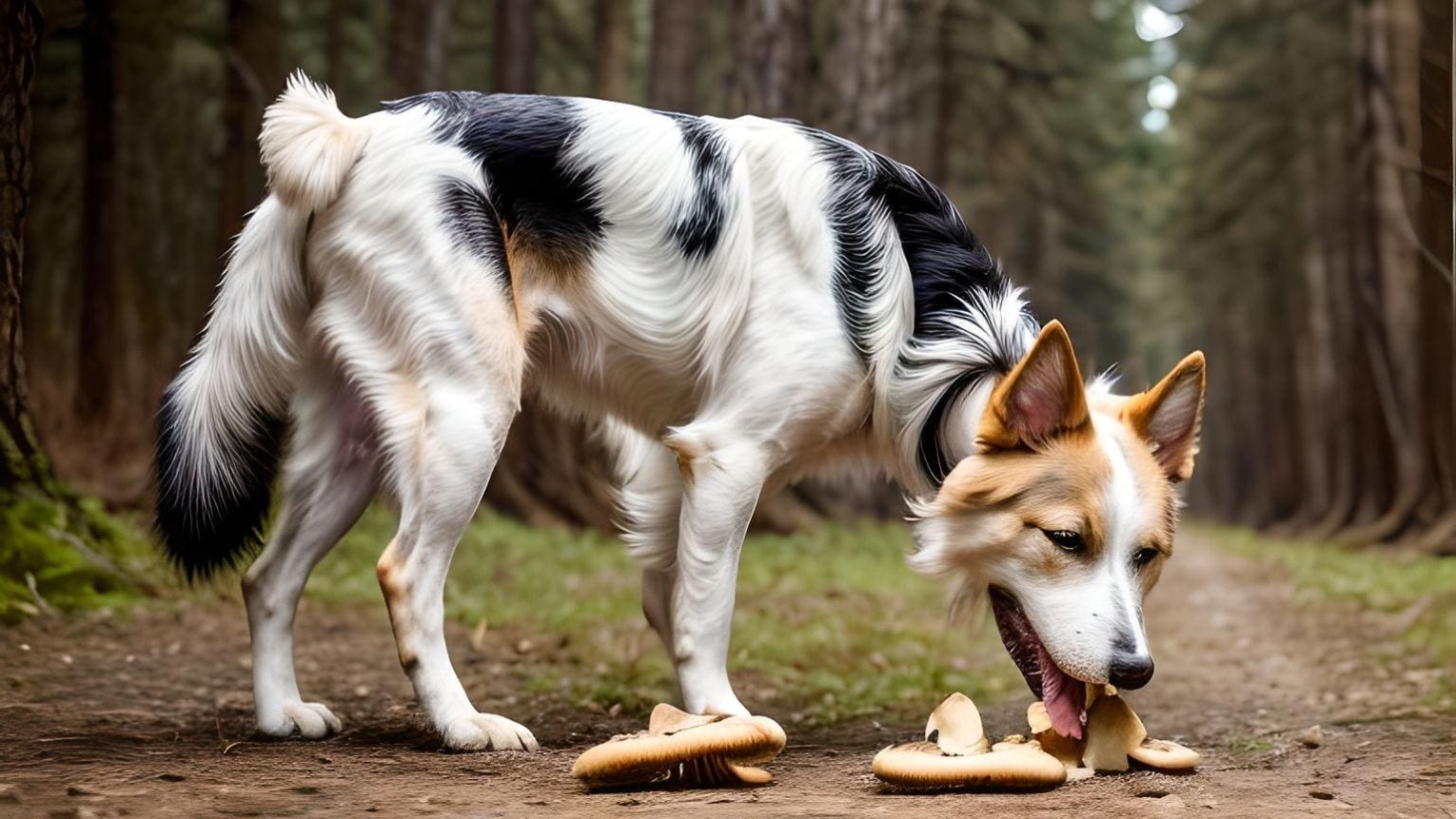Can Dogs Eat Mushrooms | Health Issues, 5 Benefits, Risks, Nutritional Value
Dogs have long held the title of “man’s best friend,” and as responsible pet owners, we strive to provide them with the best care possible. Part of this care involves ensuring that our furry companions receive a balanced and nutritious diet. However, when it comes to feeding our dogs, we often encounter conflicting information, particularly regarding certain foods like mushrooms. Can dogs eat mushrooms, and if so, which ones are safe? In this comprehensive guide, we will delve deep into the topic of dogs and mushrooms, exploring the types of mushrooms, potential risks, benefits, and the dos and don’ts of feeding mushrooms to your canine companion.
About Mushrooms
Mushrooms are a fascinating and diverse group of organisms that can be found all over the world. They come in various shapes, sizes, and colors, and many are enjoyed by humans in various culinary dishes. While some mushrooms are safe and even nutritious for us, the same cannot be said for our four-legged friends. Dogs have different digestive systems and metabolisms, which means that some mushrooms can pose a severe threat to their health.

This comprehensive guide aims to shed light on the topic of whether dogs can eat mushrooms, what types are safe, and what precautions to take when introducing mushrooms into your dog’s diet. We’ll explore the nutritional value of mushrooms, potential benefits, and the signs of mushroom poisoning in dogs. By the end, you’ll have a thorough understanding of how to make informed decisions about feeding mushrooms to your canine companion.
Types of Mushrooms
Before delving into whether dogs can safely consume mushrooms, it’s essential to understand that not all mushrooms are created equal. In the fungal kingdom, there are thousands of mushroom species, but only a fraction of them are edible for humans, and an even smaller fraction are safe for dogs.
Edible Mushrooms for Humans
- Button Mushrooms (Agaricus bisporus): These are one of the most common and widely consumed mushrooms worldwide. They are safe for humans but not recommended for dogs due to their limited nutritional value.
- Portobello Mushrooms: These are mature button mushrooms with a more robust flavor. While safe for humans, they aren’t the best choice for dogs either.
- Shiitake Mushrooms (Lentinula edodes): These are a popular choice in Asian cuisine and offer some potential health benefits for humans. However, they are not recommended for dogs due to their tough texture.
- Oyster Mushrooms (Pleurotus ostreatus): These mushrooms are enjoyed by many people but are not toxic to dogs in small amounts. However, they don’t provide significant nutritional benefits for canines.
Wild Mushrooms
Wild mushrooms, which grow in various environments, pose a significant risk to both humans and dogs. Many wild mushrooms are toxic and can lead to severe health issues or even death. Dogs often encounter wild mushrooms during outdoor activities, and it’s crucial to prevent them from consuming any wild mushrooms.
Can Dogs Eat Mushrooms?
Mushrooms are a bit of a mixed bag when it comes to dogs. While some mushrooms are safe for dogs to consume, many varieties are toxic and can be harmful or even deadly. Here are some key points to consider regarding dogs and mushrooms:
- Wild Mushrooms: Many wild mushrooms are toxic to both humans and dogs. Some toxic mushrooms can cause severe health issues, including organ failure and death. It’s essential to prevent your dog from consuming any wild mushrooms they may encounter on walks or in your yard.
- Store-Bought Mushrooms: Common mushrooms found in grocery stores, such as white button mushrooms, cremini mushrooms, and portobello mushrooms, are generally safe for dogs to eat when cooked. However, they should be given in moderation and prepared without any added seasonings, oils, or other potentially harmful ingredients.
- Toxic Varieties: Some types of mushrooms, even those found in stores, can be toxic. Dogs should not consume varieties like Amanita muscaria, also known as fly agaric, which can be dangerous if ingested.
- Allergic Reactions: Some dogs may be allergic to mushrooms, experiencing symptoms such as gastrointestinal upset or skin irritation when consuming them. Monitor your dog when introducing new foods to their diet.
- Consult Your Vet: If you’re considering incorporating mushrooms into your dog’s diet or if you suspect your dog has ingested wild mushrooms, it’s advisable to consult your veterinarian. They can provide guidance specific to your dog’s health and dietary needs.

In summary, while certain store-bought mushrooms can be safe for dogs in moderation, it’s crucial to be cautious and ensure you are offering non-toxic varieties. Additionally, it’s best to avoid wild mushrooms altogether, as many can be toxic to dogs. Always consult your veterinarian if you have concerns about your dog’s diet or if you suspect mushroom ingestion.
Can Dogs Eat Mushrooms Cooked?
Cooked mushrooms can be safe for dogs when prepared plain without added seasonings, oils, or other potentially harmful ingredients. Commonly found varieties like white button mushrooms, cremini mushrooms, and portobello mushrooms are generally considered safe for dogs in moderation. However, it’s crucial to note that not all mushrooms are safe, and some can be toxic to dogs. To ensure your dog’s safety, it’s best to serve them plain and unseasoned, and moderation is key to prevent any potential digestive upset. It’s also essential to monitor your dog for any adverse reactions, as some dogs may have allergies to mushrooms.
Can Dogs Eat Portobello Mushrooms?
Portobello mushrooms are a cultivated mushroom variety and are generally safe for dogs when cooked and offered in moderation. These mushrooms are known for their meaty texture and are often used in human cuisine. Like with other mushrooms, they should be served plain without any additional ingredients that might be harmful to your pet. While they are not toxic to dogs, it’s essential to avoid any seasonings, oils, or other additives that could potentially harm your dog.
Can Dogs Eat Shiitake Mushrooms?
Shiitake mushrooms are another type of mushroom that is safe for dogs when cooked. These mushrooms are often used in various dishes and are considered safe for dogs to consume in moderation. As with other mushroom varieties, they should be plain and unseasoned. Avoid giving dogs any wild or toxic mushrooms, as those can be harmful. Dogs can occasionally enjoy cooked, plain shiitake mushrooms, but it’s important to avoid any added ingredients that might be harmful to them.
Can Dogs Eat White Mushrooms?
White mushrooms, which include common varieties like button mushrooms, are typically safe for dogs to eat when cooked. They are known for their mild flavor and are widely used in cooking. As with other mushrooms, they should be served plain and unseasoned. While they are generally safe, moderation is important. Excessive consumption can lead to digestive issues in dogs. Furthermore, as with all new foods, it’s important to monitor your dog for any adverse reactions when introducing them to their diet.
Can Dogs Eat Baby Bella Mushrooms?
Baby bella mushrooms are a type of cultivated mushroom and are considered safe for dogs when cooked and offered in moderation. They are similar to white button mushrooms but have a slightly deeper flavor. As with other mushrooms, they should be plain and unseasoned to avoid any potentially harmful ingredients. While they are not toxic to dogs, moderation is crucial to prevent digestive issues. Additionally, always monitor your dog for any allergic reactions, as some dogs may be sensitive to mushrooms.

Can Dogs Eat Cream Of Mushroom Soup?
Cream of mushroom soup is typically not recommended for dogs. While the cooked mushrooms themselves might be safe for dogs, cream of mushroom soup often contains ingredients that can be harmful to them. It frequently includes cream, butter, seasonings, and sometimes even onions, which can be toxic to dogs. For the safety and well-being of your dog, it’s best to avoid feeding them cream-based soups, including cream of mushroom.
Can Dogs Eat Mushroom Soup?
Mushroom soup, in general, should be avoided for dogs. While the mushrooms themselves may be safe when cooked, mushroom soups often contain ingredients that can be harmful to dogs. Some of these ingredients may include onions, garlic, cream, and other seasonings that can be toxic or irritating to dogs. To ensure your dog’s safety, it’s advisable to choose dog-safe treats and foods and avoid sharing human soups with your pet.
Can Dogs Eat Raw Mushrooms?
Feeding raw mushrooms to dogs is generally discouraged. Some raw mushrooms can be challenging for dogs to digest and may cause gastrointestinal upset. Cooking mushrooms can make them easier for dogs to digest and can also eliminate potential toxins or contaminants. It’s crucial to serve mushrooms cooked and plain to ensure your dog’s safety and digestive health. Raw mushrooms can be a potential source of gastrointestinal discomfort.
Can Dogs Eat Button Mushrooms?
Button mushrooms, a common variety, are generally safe for dogs to eat when cooked and served in moderation. They are known for their mild and slightly earthy flavor. Like with other mushroom varieties, they should be plain and unseasoned. While they are generally considered safe, moderation is important to prevent digestive upset. As with any new foods, it’s advisable to monitor your dog for any adverse reactions when introducing them to their diet.
Can Dogs Eat Mushrooms From The Grocery Store?
Mushrooms purchased from a grocery store, such as white button mushrooms or portobello mushrooms, can be safe for dogs when cooked and served without added seasonings or oils. It’s essential to choose non-toxic varieties and avoid any harmful ingredients. However, moderation remains key to prevent digestive issues, and always monitor your dog for any adverse reactions, as some dogs may have allergies to mushrooms.
Can Dogs Eat Wild Mushrooms?
Most wild mushrooms should be considered off-limits for dogs. Many wild mushrooms are toxic and can cause severe health issues, including organ failure and death. To ensure your dog’s safety, it’s crucial to prevent them from consuming any wild mushrooms they may encounter during walks or in your yard. It’s often challenging to distinguish between toxic and non-toxic wild mushrooms, so it’s best to err on the side of caution and keep your dog away from them.
Can Dogs Eat Canned Mushrooms?
Canned mushrooms are typically safe for dogs when cooked and served in moderation. However, it’s essential to choose canned mushrooms that are plain and free from added seasonings or excessive salt. Always check the ingredients label to ensure there are no potentially harmful additives. As with other types of mushrooms, moderation is key to avoid digestive issues, and it’s important to monitor your dog for any adverse reactions when introducing new foods.
Can Dogs Eat Mushrooms From Pizza?
The mushrooms found on pizza are typically safe for dogs when they are cooked and plain. If you wish to share pizza with your dog, it’s important to remove any other potentially harmful toppings, such as onions, garlic, or certain spices. The dough and cheese should also be given in moderation, as they can be high in calories and fat. Pizza, even with safe toppings like mushrooms, should only be an occasional treat for your dog.
Can Dogs Eat Oyster Mushrooms?
Oyster mushrooms are considered safe for dogs when cooked and offered in moderation. These mushrooms have a delicate flavor and a unique appearance. As with other mushrooms, they should be plain and unseasoned to avoid any potentially harmful ingredients. Moderation is essential to prevent digestive upset, and it’s also important to monitor your dog for any allergic reactions, as some dogs may be sensitive to certain foods.

Can Dogs Eat Portabella Mushrooms?
Portabella mushrooms, often used in human cuisine, are safe for dogs when cooked and served in moderation. These mushrooms are known for their large size and meaty texture. They should be plain and unseasoned, like other mushrooms, to avoid any harmful ingredients. While they are not toxic to dogs, moderation is key to prevent any potential digestive issues. Additionally, always monitor your dog for any allergic reactions, as some dogs may be sensitive to certain foods.
Can Dogs Eat Morel Mushrooms?
Morel mushrooms are considered safe for dogs when cooked and offered in moderation. These mushrooms are considered a gourmet variety and are known for their distinctive appearance and flavor. As with other mushrooms, they should be plain and unseasoned to avoid any potentially harmful ingredients. Moderation is important to prevent digestive issues, and it’s also crucial to monitor your dog for any adverse reactions, as some dogs may be sensitive to certain foods.
Can Dogs Eat Mushroom Gravy?
Mushroom gravy is generally not recommended for dogs. While the cooked mushrooms themselves might be safe, mushroom gravies often contain ingredients that can be harmful to dogs, such as cream, butter, seasonings, and sometimes even onions or garlic. These additional ingredients can be toxic or irritating to dogs. To ensure your dog’s safety and well-being, it’s best to avoid feeding them gravy, including mushroom gravy, and opt for dog-safe treats and foods instead.
Are Mushrooms Safe for Dogs?
The safety of mushrooms for dogs depends largely on the type of mushroom in question. Some mushrooms are safe for dogs in small quantities, while others are highly toxic and can be lethal even in tiny amounts. It’s crucial to exercise extreme caution when considering feeding mushrooms to your dog.
Safe Mushrooms for Dogs
Certain mushrooms are generally considered safe for dogs when served in moderation. These include:
- White Mushrooms (Agaricus bisporus): While not highly nutritious, white mushrooms are generally safe for dogs when cooked. However, they should only be offered in small amounts and as an occasional treat.
- Crimini Mushrooms: These are closely related to white mushrooms and have a similar safety profile for dogs. As with white mushrooms, they should be cooked and given in moderation.
- Portobello Mushrooms: Portobellos are safe for dogs in small quantities, as long as they are cooked. Raw portobello mushrooms are not recommended.
- Champignon Mushrooms: These are a type of cultivated white mushroom and can be safe for dogs when cooked. Again, moderation is key.
Toxic Mushrooms for Dogs
The real danger lies in the various toxic mushrooms that can be found in the wild and sometimes even in gardens. Some of the most toxic mushrooms for dogs include:
- Amanita phalloides (Death Cap Mushroom): This is one of the deadliest mushrooms for both humans and dogs. Ingesting even a small amount can lead to severe liver and kidney damage or death.
- Amanita muscaria (Fly Agaric): Another highly toxic mushroom, the fly agaric can cause hallucinations, seizures, and even death in dogs.
- Amanita pantherina (Panther Cap): Similar in toxicity to the fly agaric, the panther cap can cause severe illness or death in dogs.
- Galerina marginata: These small, brown mushrooms are often mistaken for edible varieties. In reality, they are highly toxic and can be lethal to dogs.
- Inocybe spp.: This group of mushrooms contains several highly toxic species that can lead to severe symptoms, including tremors and seizures.
- Clitocybe dealbata (Ivory Funnel): Ingesting this mushroom can cause digestive upset, drooling, and in severe cases, neurological symptoms.
- Gyromitra spp. (False Morels): False morels contain a compound called gyromitrin, which can cause severe symptoms, including vomiting, seizures, and liver damage.
It’s crucial for dog owners to be able to identify toxic mushrooms and prevent their pets from coming into contact with them during outdoor activities.
Nutritional Value of Mushrooms
Before deciding whether to incorporate mushrooms into your dog’s diet, it’s essential to consider their nutritional value. While mushrooms offer some nutritional benefits, they are not a primary source of nutrition for dogs.
Mushrooms are low in calories and fat, making them a suitable option for dogs that need to lose weight or maintain a healthy weight. They also contain essential nutrients such as:
- Protein: Mushrooms contain a modest amount of protein, which can contribute to your dog’s overall protein intake.
- Fiber: The fiber in mushrooms can support digestive health and help regulate bowel movements.
- Vitamins and Minerals: Mushrooms contain vitamins and minerals such as vitamin D, potassium, and B vitamins, which can be beneficial for your dog’s health.
- Antioxidants: Some mushrooms, like shiitake mushrooms, contain antioxidants that may have health-promoting properties.
However, it’s important to note that the nutritional content of mushrooms can vary depending on the type and how they are prepared. While mushrooms can be a healthy addition to your dog’s diet in moderation, they should not replace high-quality dog food designed to meet their specific nutritional needs.
Benefits of Feeding Mushrooms to Dogs
While mushrooms should not be a staple in your dog’s diet, there are potential benefits to incorporating them in moderation:
1. Weight Management
Mushrooms are low in calories and fat, making them a suitable addition to the diet of dogs that need to lose weight or maintain a healthy weight.
2. Fiber for Digestive Health
The fiber in mushrooms can help support your dog’s digestive system. It can aid in regulating bowel movements and may be particularly useful for dogs with mild digestive issues.
3. Nutrient Boost
Mushrooms provide essential nutrients such as vitamins (e.g., vitamin D and B vitamins) and minerals (e.g., potassium). These nutrients can contribute to your dog’s overall health.
4. Antioxidants
Some mushroom varieties, like shiitake mushrooms, contain antioxidants that may have potential health benefits. Antioxidants help combat free radicals in the body, which can reduce the risk of chronic diseases.
It’s important to emphasize that while mushrooms offer these potential benefits, they should be viewed as supplementary treats and not a primary component of your dog’s diet. Always consult your veterinarian before making significant dietary changes for your dog.
How to Safely Introduce Mushrooms to Your Dog’s Diet
If you’ve decided to introduce mushrooms into your dog’s diet, it’s crucial to do so safely and gradually. Follow these steps to ensure a smooth transition:

1. Consult Your Veterinarian
Before adding mushrooms to your dog’s diet, consult your veterinarian. They can assess your dog’s individual health needs and provide specific recommendations based on factors like age, breed, and any existing health conditions.
2. Choose Safe Mushroom Varieties
Stick to safe mushroom varieties like white mushrooms, crimini mushrooms, or portobello mushrooms. Avoid any wild or exotic mushrooms, as they may be toxic.
3. Cook Mushrooms Thoroughly
Mushrooms should always be cooked before feeding them to your dog. Cooking helps break down the mushroom’s cell walls, making them easier for your dog to digest.
4. Start with Small Quantities
Introduce mushrooms in small amounts. Start with a tiny portion to see how your dog reacts, and gradually increase the serving size if they tolerate them well.
5. Observe Your Dog
Pay close attention to how your dog responds to the introduction of mushrooms into their diet. Look for any signs of digestive upset or allergies, such as vomiting, diarrhea, or skin reactions. If you notice any adverse reactions, discontinue feeding mushrooms immediately.
6. Balance with Their Regular Diet
Mushrooms should complement your dog’s regular diet rather than replace it. Ensure that the majority of their nutrition comes from high-quality dog food formulated to meet their specific needs.
7. Monitor Their Overall Health
Continuously monitor your dog’s overall health and well-being when introducing new foods, including mushrooms. If you notice any unusual behavior or symptoms, consult your veterinarian promptly.
Cooking Mushrooms for Dogs
When preparing mushrooms for your dog, it’s essential to cook them thoroughly. Cooking helps break down the tough cell walls of mushrooms, making them easier for your dog to digest. Follow these steps to prepare mushrooms for your canine companion:
- Cleaning: Start by cleaning the mushrooms to remove any dirt or debris. You can do this by gently wiping them with a damp cloth or using a mushroom brush.
- Slicing: Slice the mushrooms into small, bite-sized pieces. This makes them more manageable for your dog to eat and digest.
- Cooking: Choose a cooking method that doesn’t involve adding excessive fats or seasonings. Steaming, boiling, or sautéing mushrooms in a small amount of water or dog-safe broth is recommended. Avoid using oils, butter, or spices, as they can be harmful to dogs.
- Cooling: Allow the cooked mushrooms to cool completely before offering them to your dog. Hot food can cause burns or discomfort.
- Serving: Serve the cooked mushrooms in small portions as a treat or as part of your dog’s meal. Remember that mushrooms should be a supplement to their regular diet, not the main course.
- Observation: Pay close attention to how your dog reacts to the cooked mushrooms. If they show any signs of digestive upset or allergies, discontinue feeding mushrooms immediately.
Signs of Mushroom Poisoning in Dogs
Mushroom poisoning in dogs can have severe and potentially fatal consequences. If you suspect your dog has ingested a toxic mushroom, it’s essential to recognize the signs of mushroom poisoning and seek immediate veterinary attention. Common signs of mushroom poisoning in dogs include:
- Vomiting
- Diarrhea
- Abdominal pain
- Tremors or seizures
- Excessive drooling
- Lethargy
- Loss of coordination
- Jaundice (yellowing of the skin and eyes)
- Coma
It’s important to note that symptoms may not appear immediately after ingestion and can vary depending on the type of mushroom and the amount consumed. If you suspect your dog has eaten a toxic mushroom, don’t wait for symptoms to develop—seek veterinary care immediately.
Treatment for Mushroom Poisoning
If your dog ingests a toxic mushroom, prompt and appropriate treatment is crucial for their survival. Treatment for mushroom poisoning in dogs typically includes the following steps:
- Induce Vomiting: In some cases, a veterinarian may induce vomiting to remove any remaining mushrooms from the stomach.
- Activated Charcoal: Activated charcoal may be administered to absorb toxins and prevent them from being absorbed into the bloodstream.
- Supportive Care: Your dog may require supportive care, including intravenous fluids, medications to control symptoms such as seizures or diarrhea, and liver support.
- Hospitalization: Depending on the severity of the poisoning, your dog may need to be hospitalized for close monitoring and treatment.
The prognosis for mushroom poisoning in dogs varies depending on factors like the type of mushroom, the amount ingested, and the timeliness of treatment. Some cases can be successfully treated with early intervention, while others may have a more guarded prognosis.
Conclusion:
In conclusion, the question of whether dogs can eat mushrooms has a complex answer. While some mushrooms are safe for dogs in small quantities and offer potential health benefits, many mushrooms are highly toxic and can be deadly. To ensure the safety and well-being of your canine companion, it’s essential to exercise caution when considering mushrooms as part of their diet.
Always consult your veterinarian before introducing mushrooms or any new food into your dog’s diet. When incorporating mushrooms, choose safe varieties, cook them thoroughly, and monitor your dog for any adverse reactions. Most importantly, educate yourself on the types of toxic mushrooms that may be present in your area and take steps to prevent your dog from coming into contact with them during outdoor adventures.
Remember that mushrooms should only be a supplement to your dog’s regular diet and not a replacement for high-quality dog food designed to meet their specific nutritional needs. By taking these precautions and being well-informed, you can provide the best care for your furry friend and keep them safe from the potential dangers of toxic mushrooms.
Frequently Asked Questions:
-
Can dogs eat raw mushrooms?
It’s generally not recommended to feed dogs raw mushrooms. Raw mushrooms can be difficult for dogs to digest, and some varieties may contain compounds that are toxic when uncooked. To make mushrooms safer for your dog, always cook them thoroughly before offering them as a treat.
-
Are there any health benefits of feeding mushrooms to dogs?
Yes, there are potential health benefits to feeding certain mushrooms to dogs in moderation. Mushrooms can provide essential nutrients, including protein, fiber, vitamins, and minerals. They can also aid in weight management and support digestive health. However, it’s crucial to choose safe mushroom varieties and consult your veterinarian before incorporating them into your dog’s diet.
-
What should I do if my dog accidentally eats a wild mushroom?
If you suspect that your dog has ingested a wild mushroom, contact your veterinarian or an emergency animal clinic immediately. Do not wait for symptoms to appear, as some toxic mushrooms can lead to severe illness or death. The veterinarian will assess the situation and provide guidance on the necessary steps to take.
-
Can I give my dog store-bought mushroom supplements?
It’s generally best to avoid giving your dog store-bought mushroom supplements without consulting your veterinarian. While some mushroom supplements are marketed as beneficial for dogs, the safety and efficacy of these products can vary. Your veterinarian can recommend the most suitable supplements based on your dog’s individual health needs.
-
Are there any dog breeds that are more sensitive to mushrooms?
All dog breeds have the potential to be affected by toxic mushrooms if ingested. However, smaller breeds and puppies may be more vulnerable to mushroom toxicity due to their size and lower body weight. Regardless of breed, it’s essential for all dog owners to be vigilant about preventing their pets from consuming wild or unknown mushrooms.
-
Can dogs eat canned mushrooms?
Canned mushrooms are not recommended for dogs. These mushrooms are typically high in sodium, which can be harmful to your dog’s health in excessive amounts. Additionally, canned mushrooms may not be as suitable for your dog’s digestion as fresh, cooked mushrooms.
-
How do I prevent my dog from eating mushrooms during walks or outdoor activities?
To prevent your dog from consuming mushrooms during outdoor activities, keep them on a leash and supervise them closely. Train your dog to “leave it” when encountering unfamiliar objects on the ground. Familiarize yourself with the types of toxic mushrooms that grow in your area, and regularly inspect the environment where your dog plays or explores.
-
Can dogs eat mushrooms from my garden?
It’s generally best to discourage your dog from eating mushrooms from your garden, as some wild and potentially toxic varieties may grow there. To ensure your dog’s safety, regularly inspect your garden for mushrooms and remove them promptly. If you want to offer mushrooms to your dog, it’s safer to use store-bought, edible varieties that you’ve cooked yourself.
-
What are some signs of mushroom poisoning in dogs that I should watch for?
Signs of mushroom poisoning in dogs can vary depending on the type of mushroom ingested. Common symptoms include vomiting, diarrhea, abdominal pain, tremors, seizures, excessive drooling, lethargy, jaundice (yellowing of the skin and eyes), and loss of coordination. If you notice any of these symptoms or suspect mushroom poisoning, seek immediate veterinary care.
-
Are there any alternatives to mushrooms for providing similar nutritional benefits to my dog?
Yes, there are several safe alternatives to mushrooms that can provide similar nutritional benefits to your dog. Some options include cooked vegetables like carrots, green beans, or broccoli, as well as lean meats like chicken or turkey. Always consult your veterinarian for guidance on creating a balanced and nutritious diet for your dog.
Recommended:
Can Dogs Have Honey | 4 Health Benefits, Causes, Risks, Health Issues
Can Dogs Eat Onions: The Risks, 4 Symptoms, and Safe Practices





























